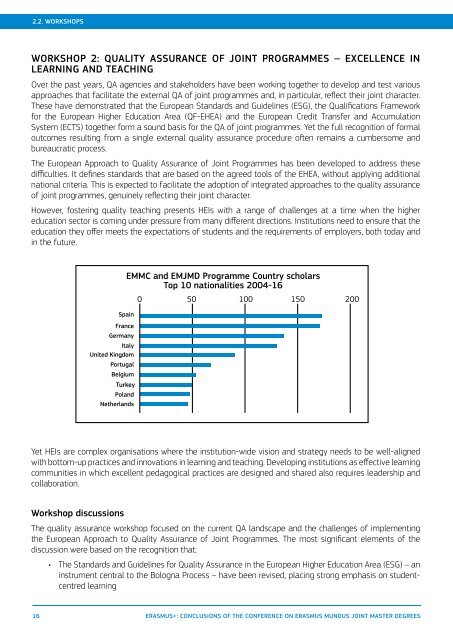Erasmus+
2kWLqbT
2kWLqbT
You also want an ePaper? Increase the reach of your titles
YUMPU automatically turns print PDFs into web optimized ePapers that Google loves.
2.2. WORKSHOPS 2.2. WORKSHOPS TITLE<br />
WORKSHOP 2: QUALITY ASSURANCE OF JOINT PROGRAMMES – EXCELLENCE IN<br />
LEARNING AND TEACHING<br />
Over the past years, QA agencies and stakeholders have been working together to develop and test various<br />
approaches that facilitate the external QA of joint programmes and, in particular, reflect their joint character.<br />
These have demonstrated that the European Standards and Guidelines (ESG), the Qualifications Framework<br />
for the European Higher Education Area (QF-EHEA) and the European Credit Transfer and Accumulation<br />
System (ECTS) together form a sound basis for the QA of joint programmes. Yet the full recognition of formal<br />
outcomes resulting from a single external quality assurance procedure often remains a cumbersome and<br />
bureaucratic process.<br />
The European Approach to Quality Assurance of Joint Programmes has been developed to address these<br />
difficulties. It defines standards that are based on the agreed tools of the EHEA, without applying additional<br />
national criteria. This is expected to facilitate the adoption of integrated approaches to the quality assurance<br />
of joint programmes, genuinely reflecting their joint character.<br />
However, fostering quality teaching presents HEIs with a range of challenges at a time when the higher<br />
education sector is coming under pressure from many different directions. Institutions need to ensure that the<br />
education they offer meets the expectations of students and the requirements of employers, both today and<br />
in the future.<br />
France<br />
Germany<br />
Italy<br />
United Kingdom<br />
Portugal<br />
Belgium<br />
Turkey<br />
Poland<br />
Netherlands<br />
EMMC and EMJMD Programme Country scholars<br />
Top 10 nationalities 2004-16<br />
0 50 100 150 200<br />
Spain<br />
Yet HEIs are complex organisations where the institution-wide vision and strategy needs to be well-aligned<br />
with bottom-up practices and innovations in learning and teaching. Developing institutions as effective learning<br />
communities in which excellent pedagogical practices are designed and shared also requires leadership and<br />
collaboration.<br />
Workshop discussions<br />
The quality assurance workshop focused on the current QA landscape and the challenges of implementing<br />
the European Approach to Quality Assurance of Joint Programmes. The most significant elements of the<br />
discussion were based on the recognition that:<br />
• The Standards and Guidelines for Quality Assurance in the European Higher Education Area (ESG) – an<br />
instrument central to the Bologna Process – have been revised, placing strong emphasis on studentcentred<br />
learning<br />
• Bologna ministers approved (in 2015) the European Approach to Quality Assurance of Joint<br />
Programmes 7<br />
• At the same time, the ministers committed to reviewing their national legislations with a view to<br />
achieving full compliance with the Lisbon Recognition Convention (LRC), including, therefore, the<br />
Convention’s ‘Recommendation on the recognition of joint degrees’ 8<br />
• The legitimacy of student participation in quality assurance procedures is now widely accepted<br />
• The efforts of students and alumni in the Erasmus Mundus Association (EMA) to monitor the quality of<br />
joint degrees continues to gather momentum<br />
United States<br />
India<br />
Canada<br />
China<br />
Brazil<br />
Australia<br />
Russian Fed<br />
Argentina<br />
Japan<br />
Mexico<br />
EMMC and EMJMD Partner Country scholars<br />
Top 10 nationalities 2004-16<br />
0 200 400 600 800 1000<br />
The revised ESG, by refreshing the consensus, bring particular questions into the foreground. At the level of<br />
course design, how can ‘jointness’ be enhanced? Here there was a clear view. It would be by aligning the<br />
academic strategies of all the partners and by expressing ‘jointness’ in the learning outcomes, a process<br />
requiring active staff exchange between partner HEIs and the involvement of teaching staff at all levels in<br />
continuous course development. It would also be by involving stakeholders in the overall architecture of the<br />
course, rather than merely in its constituent parts.<br />
And in terms of course delivery, how can student-centred learning be embedded and evaluated? Participants<br />
stressed the crucial role played by academic counselling in negotiating the transitions between different<br />
learning cultures and environments. Mobile students require support when moving between placements. For<br />
them, the academic and the personal are not easily separable; institutions must therefore work to ensure the<br />
best possible collaboration and understanding between their specialist internal agencies.<br />
How can ‘jointness’ be assessed, when the course is distributed between different national quality assurance<br />
regimes? The workshop considered this question, coming up with a litany of the impediments that national<br />
legislations still inflict on joint programmes. To cite just a few: the fact that external stakeholder involvement<br />
in course design is not legal in every jurisdiction; the fact that in some countries courses can be modified only<br />
at the point of application for re-accreditation; the insistence on award templates which cannot accommodate<br />
multi-partner cross-border course delivery.<br />
7 https://www.eqar.eu/fileadmin/documents/bologna/02_European_Approach_QA_of_Joint_Programmes_v1_0.pdf<br />
8 https://wcd.coe.int/com.instranet.InstraServlet?command=com.instranet.CmdBlobGet&InstranetImage=320284&SecMode=1&DocId=822138&Usage=2<br />
16 ERASMUS+: CONCLUSIONS OF THE CONFERENCE ON ERASMUS MUNDUS JOINT MASTER DEGREES<br />
ERASMUS+: CONCLUSIONS OF THE CONFERENCE ON ERASMUS MUNDUS JOINT MASTER DEGREES<br />
17


